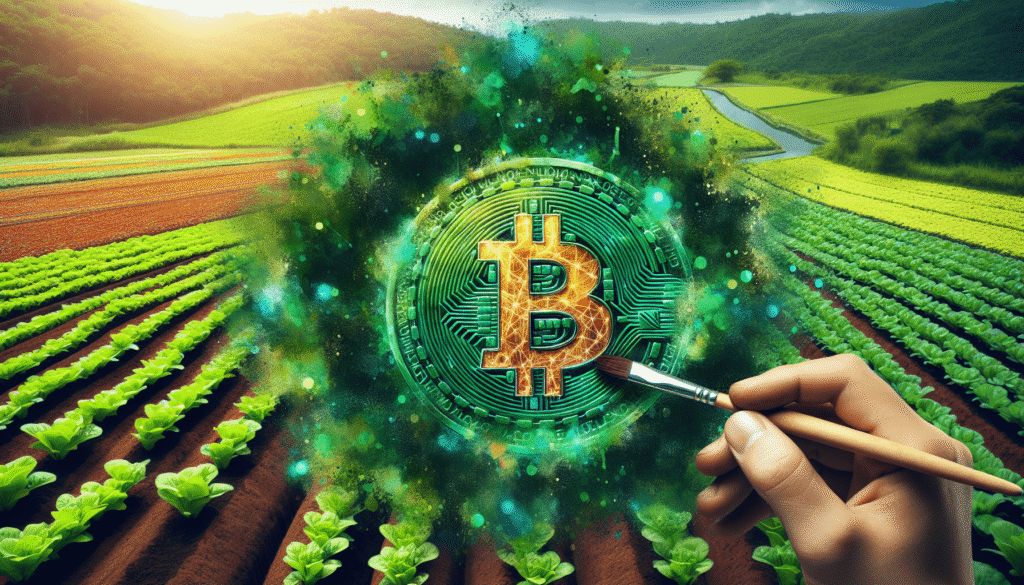Have you ever wondered how cryptocurrency could revolutionize organic farming, creating a synergy between cutting-edge technology and sustainable agriculture? This intriguing intersection opens up a world of possibilities that can reshape the way you think about food production and the financial systems supporting it. The concept of combining blockchain technology and crypto-assets with organic farming practices may initially seem unrelated, but let’s explore how these two worlds are converging in innovative ways.
What is Organic Farming?
Before diving into the role cryptocurrency might play, it’s essential to understand what organic farming entails. Organic farming is a method of agriculture that focuses on cultivating food in a more environmentally friendly way. It emphasizes crop rotation, use of natural fertilizers, and biological pest control over synthetic chemicals. By maintaining ecological balance and conserving biodiversity, organic farming aims to be more sustainable than conventional agricultural practices.
Principles of Organic Farming
- Soil Health: Organic farming starts with nurturing the soil. Healthy soil leads to healthy crops, which means using natural fertilizers like compost and manure instead of synthetic ones.
- Biodiversity: Organic farms tend to support a greater variety of plants, insects, and animals, which contributes to the resilience of the farm ecosystem.
- Ecological Balance: Pest control in organic farming relies more on natural predators and plant diversity rather than chemicals.
- Sustainability: Organic farming practices are designed to be sustainable for the long term, reducing environmental impact and conserving resources.
Benefits of Organic Farming
Organic farming offers several benefits that can entice you to choose organic products. These include producing healthier food free from synthetic pesticides, promoting environmental health through reduced pollution, and fostering economic benefits by creating more labor-intensive jobs. It’s about developing a farming model that respects the environment and supports local farmers, potentially leading to a robust and sustainable agribusiness.
Cryptocurrency: A Brief Overview
Now that you have a grasp of organic farming, let’s touch on cryptocurrency. Crypto, or digital currency, is based on blockchain technology that allows for secure, decentralized transactions. Unlike traditional currencies, there is no central authority, like a bank, governing its flow.
Key Features of Cryptocurrency
- Decentralization: Controlled by a network of computers, making it less susceptible to government interference or manipulation.
- Security: Blockchain technology ensures encryption and verification for transactions, enhancing security.
- Transparency: Every transaction is recorded on a public ledger, promoting transparency.
- Global Reach: Cryptocurrency transcends borders and can be used anywhere, enabling direct transactions without intermediaries.

The Convergence: How Crypto May Influence Organic Farming
Bringing cryptocurrency into organic farming presents new opportunities for innovation. Let’s examine how these two fields may work together to transform agriculture.
Financing and Investment Opportunities
Cryptocurrency can serve as an innovative way for organic farming projects to raise capital. Initial Coin Offerings (ICOs) and other crypto-financing methods can provide farmers with much-needed funds. This allows for community-supported agriculture initiatives, where people invest in farm operations using crypto-token models.
- Investment Platforms: New platforms could emerge, allowing you to invest in organic farms directly, possibly earning returns based on farm performance.
- Crowdfunding: Similar to Kickstarter, farms could use crypto to crowdfund specific projects, engaging the community in sustainable production.
Supply Chain Transparency
Blockchain’s immutable ledger can help create transparency in the supply chain. This can assure you that the organic products you’re purchasing are genuine, from farm to table. With every step recorded, you might see detailed histories of your food, verifying its organic origins and handling processes.
Potential Application
| Application | Description |
|---|---|
| Product Tracking | Track products throughout the supply chain to ensure authenticity and organic certification. |
| Smart Contracts | Automate transactions based on predefined conditions, increasing efficiency and reducing errors. |
| Provenance Records | Maintain permanent records of a product’s journey, providing consumer assurance of quality and origin. |
Reducing Transaction Costs
Cryptocurrency can minimize transaction fees compared to traditional banking systems. This efficiency could benefit both you and farmers, as transactions are faster and more cost-effective—ultimately fostering market accessibility for organic producers.
Enhancing Global Trade
With the ability to facilitate seamless international payments, crypto can open global markets for organic farmers, previously limited by exchange rates and banking requirements. You, as a consumer, could enjoy easier access to organic goods from diverse regions, broadening your product choices.
Rewards and Loyalty Programs
Creating new reward systems using crypto-tokens, organic farms can incentivize environmentally friendly behavior among consumers. These loyalty programs could provide discounts or exclusive products for supporting sustainable farms, fostering a stronger connection between you and the organic community.
Challenges and Considerations
As with any new innovation, integrating cryptocurrency into organic farming isn’t without its challenges. Understanding these hurdles will give you a realistic perspective on what lies ahead.
Volatility and Security Concerns
Cryptocurrencies are known for their price volatility. Fluctuating values can pose challenges for farmers relying on a stable investment platform. Additionally, the security of transactions and wallets remains crucial, as potential cyber threats could impact both farmers and consumers like you.
Regulatory Uncertainties
Governments worldwide are still grappling with how to regulate cryptocurrencies. The lack of clear regulations can create uncertainty for businesses and consumers, potentially impacting how crypto is used in organic farming.
Technological Barriers
Adopting cryptocurrency requires technological infrastructure that may not be readily available in rural areas. Overcoming this barrier will be essential for organic farming communities to fully embrace the benefits of crypto technology.
Education and Awareness
For you to participate effectively, there needs to be a strong understanding of how cryptocurrency and blockchain work. This involves educating both farmers and consumers about the potential and functioning of these digital assets in the organic farming sector.

Case Studies: Real-world Examples
To better illustrate the potential impact of cryptocurrency on organic farming, let’s look at some real-world examples where these technologies have already started making a difference.
AgriLedger in Haiti
A project using blockchain to provide farmers with a mobile app that tracks food distribution and sales, ensuring fair prices. This initiative highlights how technology can empower small-scale farmers by giving them more control and transparency over their produce.
Tea Farmers in India
Some tea farms have started using blockchain to track their product from harvest to sale. This transparency allows buyers worldwide to verify the authenticity and quality of the tea, fostering trust and ensuring fair trade practices.
The Future of Crypto in Organic Farming
If the challenges are addressed effectively, the future holds immense promise for enhancing organic agriculture with blockchain and cryptocurrency technologies. This fusion could support sustainable practices, offer greater economic benefits to farmers, and give you even more reasons to choose organic.
Potential Growth Areas
- Decentralized Farming Networks: Enabling farms to collaborate globally, sharing resources and knowledge through blockchain.
- Smart Agricultural Contracts: Automating agricultural processes and transactions, reducing the need for intermediaries, and simplifying operations.
- Sustainable Investment Models: Developing eco-friendly crypto assets that support organic and sustainable initiatives.
The Role of the Consumer
Your role is pivotal in this transformation. By understanding and supporting the use of crypto in organic farming, you can influence market trends, support sustainable practices, and demand transparency and quality in food production.
Conclusion: Embracing the Potential
As you consider the intersection of cryptocurrency and organic farming, it’s clear that immense potential awaits. While challenges need addressing, the promise of innovation through secure, efficient, and transparent systems can revolutionize the agricultural landscape. By engaging in this evolution, you stand to benefit from healthier food choices and a more sustainable world. Together, envision a future where technology supports the integrity and vitality of organic farming, ensuring a healthier planet for generations to come.

